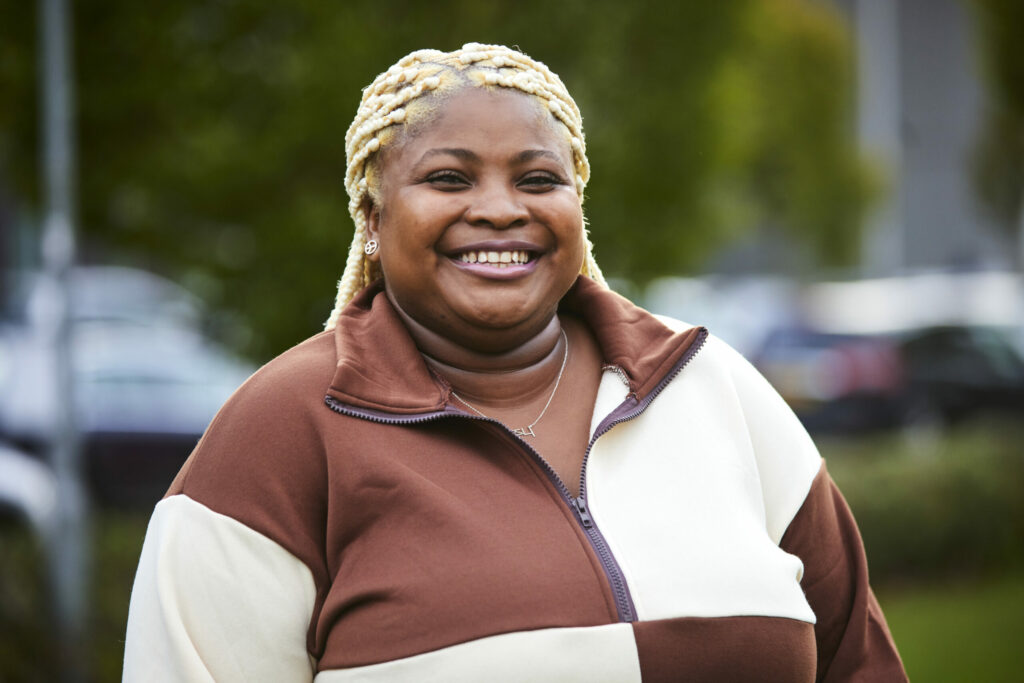A Mancunian woman revives her dream to visit the North Pole after receiving new NHS treatment for Sickle Cell.
When Gloria Adebisi Ademolu was a little girl, she loved snow but her condition meant that she couldn’t even enjoy a cold drink. While other children played outside in winter, she had to stay indoors where it was safe.

“For people with Sickle Cell, our immune system is really bad,” Gloria said.
“I couldn’t do a lot of things growing up.”
Sickle cell disease is a life-long health condition that affects the red blood cells. The main symptoms are: anaemia and extreme fatigue; a risk of serious infections; and “sickle cell crises” that are painful episodes of anything from days to weeks of severe pain. Sickle cell often shows itself in early childhood.
Gloria didn’t show any noticeable signs until she turned three when her family were living in Nigeria. Her crises started then but her condition was only diagnosed after they had later moved to the UK, when she was aged seven.
Gloria said “I had my first crisis in Nigeria and the hospital didn’t know why I was in so much pain. A lot of people don’t know what sickle cell is.”
Once diagnosed with sickle cell, Gloria spent her childhood in bouts of severe pain and unable to enjoy playing outdoors. Sickle cell is a condition that many people have not heard of, and it affected her friendships.
“I’m in pain all the time, I have chronic pain. I’ve lost a lot of friends because I wasn’t able to meet up with them. It does affect your relationships with people because it seems like you just don’t want to see them. You can look at someone and just because they’re smiling and laughing, it can seem like they’re not in pain but if you walked a day in my shoes, you’d know how it feels on the inside.”

“I always wished someone else was in the same boat. And then when I was eleven, my little brother was born, and he had sickle cell too.”
Phillip, now aged 15, doesn’t have as a severe condition as his older sister but also has bouts of chronic pain.
“I hated that he had it and he was in pain. I felt so guilty like I had brought it on him myself. Being his older sister, I understand his pain more.”
Both siblings were taken ill last year, Phillip with influenza and Gloria, who was rushed to A&E, turned to have sepsis.
Dr Joseph Sharif, Haematology Consultant and Lead for Sickle Cell at Manchester Royal Infirmary said: “People with sickle cell are more susceptible to infections such as flu, Pneumonia and Meningitis. Effective treatment and prevention of infection is an essential aspect of sickle cell care.”
“Even if I’m meeting my friends outside, I’ll go home if there are large crowds,” Gloria said. “During the pandemic, I stayed completely indoors.”
Despite everything, Gloria has always had an adventurous spirit and longed to see the world. When she was fourteen, a guide at the Sickle Cell Centre in Manchester asked her to write down her dream for the future.
“I sat there and thought – I really want to go to the North Pole. Even though it’s cold. I want to be there; I want to see it physically. Even to this day, I still want to go. I want to see what it’s like in the day, and in the night. I love looking at the stars in Manchester but in the North, I’ll be able to see so much more. It’s pure nature. I want to see somewhere human beings haven’t touched. An unpolluted place that I’ll remember when I’m old.”
In May 2022, Gloria started a new treatment at the Manchester Royal Infirmary that has significantly improved her quality of life and allowed her to revive her long-cherished dream. She said: “I’m one of those people who’s always open to trying new things to help myself and others it may benefit, like my brother, so I was excited to get started. I was just like – let’s do it! I didn’t even think twice.”
The new treatment, crizanlizumab, is delivered by a transfusion drip and binds to a protein in the blood cells. It prevents the restriction of blood and oxygen supply that leads to a sickle cell crisis.
“I am very pleased that we are able to offer this treatment to our patients with sickle cell at Manchester Royal Infirmary, and the feedback from patients so far, including Gloria, has been very positive,” said Dr Sharif.
“Crizanlizumab has been shown to reduce the frequency of acute sickle pain crises. Sickle pain crises can be severe and unpredictable and often result in hospital admission and patients can become very unwell.
“Many of the patients currently receiving this treatment in the North West currently live in the Manchester area, but as the Haemoglobinopathy coordinating centre for the region, we want to ensure all patients across our catchment area have equal access to this treatment.”
Since starting the treatment, Gloria has noticed a major difference. “I’m not as tired as I used to be and I don’t feel as much pain – I can tell because I don’t take as much pain medication as I used to. I have more energy to do things, I feel more energized to go out. I don’t have to stay in bed all day. The best thing is now I can say, ‘okay, now I can start living a life that I actually do want to live without fear of my condition triggering itself’.
“The North Pole is absolutely freezing so it is a crazy idea, but maybe after a year or two of this treatment, I might be able to go. This treatment has given me the opportunities I wish I could have had years ago.”
